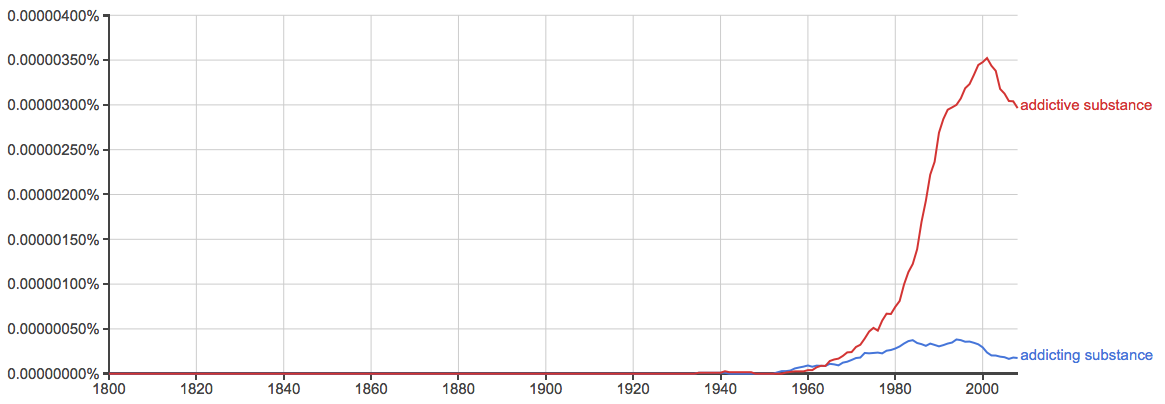Is your favorite new show addicting or addictive?
It seems like a choice between these words might be splitting hairs. Both are used as adjectives, especially in informal writing and spoken English.
While either of these options will work, one is usually considered a better option. Continue reading to learn more about these confusing words.
What is the Difference Between Addicting and Addictive?
In this post, I will compare addictive vs. addicting. I will use each of these words in at least one example sentence, so you can see them in context.
Plus, I will show you a helpful memory tool that you can use to make choosing addictive or addicting a little easier.
When to Use Addicting
 What does addicting mean? Addicting is a verb. It is the present participle of the verb addict, which means to cause someone to be physiologically dependent.
What does addicting mean? Addicting is a verb. It is the present participle of the verb addict, which means to cause someone to be physiologically dependent.
As is the case with addictive, addicting is often used outside of this medical context to loosely refer to anything habitually enjoyable, like games, media, and junk food.
For example,
- Cocaine is addicting thousands of youths on the street each day.
- Overmedication is addicting young children to drugs from a very early age.
- But it took off in the 1990s, as drug companies and medical experts argued that opioids could be used to treat chronic conditions like back pain without addicting patients. –The New York Times
This usage is rare, and can feel clumsy. Most writers would probably rephrase these sentences to something like the following,
- Overmedication of drugs is causing young children to develop addictions from an early age.
As a past participle, addicting can also be used as an adjective, and this usage is much more common. Some writers argue that since addictive is already a word, there is little reason to use addicting as an adjective. Still, the usage persists, and most dictionaries mark this as an informal word choice, which means it isn’t suitable for formal or professional writing.
The chart below shows the relative usage of addicting vs. addictive as an adjective,

Addictive is much more popular as an adjective. This chart isn’t scientific, since it only looks at books published in English since 1800, but it still establishes a long-term usage trend.
When to Use Addictive
 What does addictive mean? The word addictive is an adjective. In its purest medical sense, it means causing physiological dependence, as with certain habit-forming drugs.
What does addictive mean? The word addictive is an adjective. In its purest medical sense, it means causing physiological dependence, as with certain habit-forming drugs.
In popular usage, however, it is used less strictly. A friend might call her new favorite TV show addictive if she can’t stop watching it, or someone might find video games addictive.
Someone with an addictive personality is predisposed to developing addictions or obsessions.
For example,
- Mallory began using addictive drugs in high school, and is now in rehab.
- “I love the show Happy Days; it is so addictive!” said Chelsea.
- Look out, America: Here comes “Honor of Kings,” the Chinese videogame so addictive that its maker imposed a curfew on the youngest enthusiasts and daily playing-time limits on players through age 18. –The Wall Street Journal
Addictive is the adjective form of the verb addict. Addiction is a noun that means a physiological dependence, and the associated adverb would be addictively.
Trick to Remember the Difference
 If you are using the word as a verb, you must use addicting. Addictive is never a verb.
If you are using the word as a verb, you must use addicting. Addictive is never a verb.
As an adjective, either word will work, but addictive is a better choice, especially for formal writing situations (like medical journals or academic writing).
Remember that addictive and adjective are both spelled with the letter V. This shared letter can be your clue that addictive is an adjective.
Summary
Is it addicting or addictive? Both of these words have to do with becoming dependent or addicted to something.
- Addictive is an adjective that means likely to cause physiological dependence.
- Addicting is a present participle of the verb addict. While either works as an adjective, addictive is the better choice.
In summary, use addictive as an adjective, and addicting as a verb.
Contents
